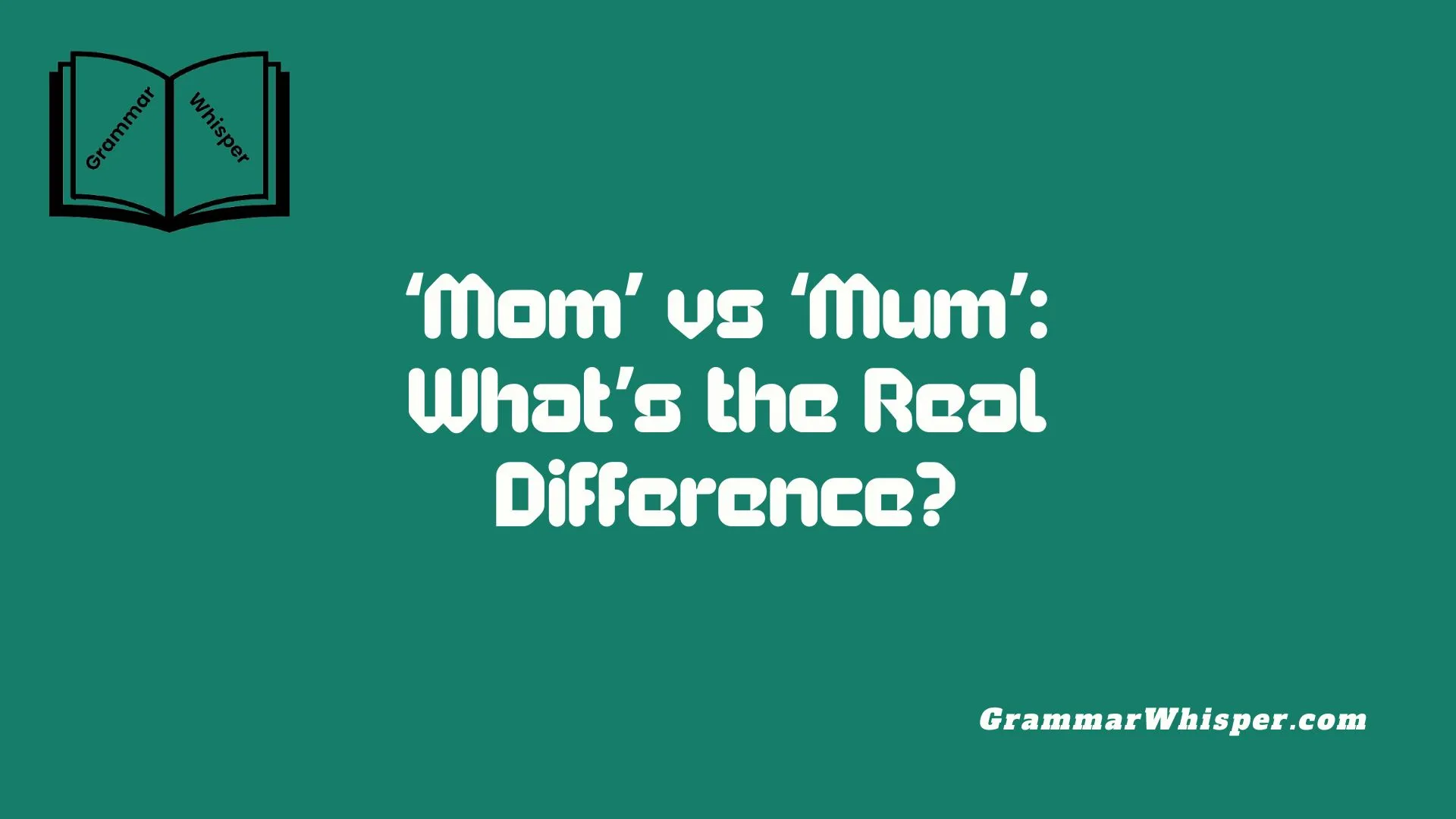The English language is packed with delightful quirks, and nothing illustrates this better than ‘Mom’ versus ‘Mum’. While both words technically mean the same – a mother – the subtle difference in spelling and pronunciation does more than distinguish dialects. It reflects personal upbringing, cultural memory, and even emotional tone. Whether you’re telling a story, sending an email, or recalling childhood, your choice of word may signal your nationality, regional roots, or how casual or formal you want to sound. I’ve often seen how someone’s accent or preference subtly shapes how they choose between them, and both terms radiate warmth, though in different linguistic colors.
During my time teaching abroad, I was regularly asked by students whether they should say ‘Mom’ or ‘Mum’. My answer? “It depends on where in the world you’re writing or speaking.” That small choice can make communication feel instantly more smoother, culturally sensitive, and aware. In the UK, ‘Mum’ matches the phonetic rhythm of British speech, while in the US, ‘Mom’ simply rolls off the tongue with ease. These aren’t arbitrary selections – they come from a rich history of phonetic shifts and regional identity. When we dig into the simple, yet profoundly charming, origins of these expressions, we find a shared human connection that transcends borders.
Rooted in Language: Etymology of ‘Mom’ and ‘Mum’
Both ‘Mom’ and ‘Mum’ find their roots in the natural sounds babies make when learning to speak. Linguists refer to these as “mama” words – universal sounds across many languages that represent the mother figure.
Origin and Evolution
- Middle English: The earliest recorded form is mam or mamme, which came from the Old English mōdor.
- Latin Influence: From Latin mamma, meaning “breast” or “mother.”
- Germanic Language Roots: Variants like mamma and mutti appear across Germanic languages.
- Baby Talk Roots: Linguists believe that repetitive syllables like ma-ma or mum-mum are phonetically easier for infants.
Over time, different cultures evolved their own shortened versions of these base terms. That’s how we got ‘Mom’ in American English and ‘Mum’ in British English.
“The word ‘Mom’ may seem simple, but it carries centuries of linguistic history in every letter.” – Dr. Deborah Tannen, Linguist
Timeline of Usage: When Did ‘Mom’ and ‘Mum’ Diverge?
Historical records show that ‘Mum’ appeared earlier in English literature, particularly in England. However, as American English began to evolve after colonization, spelling patterns changed.
Historical Milestones
- 1600s: “Mum” surfaces frequently in English literature and everyday speech in the UK.
- 1800s: American writers begin using “Mom” more commonly, especially in letters and newspapers.
- Early 1900s: The U.S. fully adopts “Mom” in literature, schooling, and formal writing.
Present Day: The split is clearly defined by region.
Here’s a quick snapshot:
| Century | UK Term Used | US Term Used | Notes |
| 1600s | Mum | Rare/Absent | Dominated by British dialects |
| 1800s | Mum | Emerging Mom | Growing separation due to cultural divergence |
| 1900s | Mum | Mom | Cemented in national identities |
| 2000s | Mum | Mom | Still dominant regionally, but exposure to both |
Regional Differences: Who Says What and Where?
The divide between ‘Mom’ and ‘Mum’ is geographical and cultural. While they mean the same thing, where you’re from usually determines which version you use.
Common Regional Usage
| Region | Preferred Term | Notes |
| United States | Mom | Universal across all states |
| United Kingdom | Mum | Standard throughout England, Wales, Scotland |
| Canada | Mom/Mum | Mixed usage, varies by region and family background |
| Australia | Mum | Strongly influenced by British English |
| New Zealand | Mum | Consistent with UK English |
| India | Mum (Urban) / Mom (Media) | Influenced by British legacy and US media |
| South Africa | Mum | UK-aligned usage in most dialects |
| Ireland | Mam/Mammy/Mum | Unique Irish variants alongside ‘Mum’ |
Interesting Case: Canada
Canada is especially fascinating. In provinces like Ontario and British Columbia, “Mom” is more common. But in Newfoundland or Nova Scotia, British heritage has kept “Mum” alive.
Cultural Identity and Language Norms
The word you use for your mother is more than just a label – it’s a marker of your cultural background.
- In the UK, “Mum” evokes tea, rainy afternoons, and family holidays to the seaside.
- In the US, “Mom” might conjure images of apple pie, baseball games, and school lunches.
- In Australia, “Mum” is part of everyday speech and seen in schoolbooks and government communication.
Using the “wrong” word can feel jarring or even out-of-place, especially in emotionally charged contexts.
“When I hear someone say ‘Mom’ in a British TV show, it instantly feels off – it breaks the immersion.” – Rachel King, Media Critic
The Role of Media and Pop Culture
Language doesn’t evolve in a vacuum. Movies, TV shows, books, and the internet all play a massive role in shaping our word choices.
How Media Has Shaped Usage
- Hollywood Influence: The global reach of American films and TV shows means many children worldwide grow up hearing “Mom.”
- British TV Shows: Shows like The Great British Bake Off and Doctor Who reinforce “Mum” internationally.
- Children’s Literature: British books often say “Mum,” while American ones use “Mom.”
Social Media Exposure
On platforms like TikTok or Instagram, people often adopt American spelling for wider engagement, even if their native form is different.
Pronunciation Differences and Phonetic Nuances
Though spelled differently, ‘Mom’ and ‘Mum’ are surprisingly similar in pronunciation. But there are subtle differences worth noting.
| Term | Pronunciation | IPA | Notes |
| Mom | /mɑːm/ or /mɒm/ | [mɒm] | Open back rounded vowel |
| Mum | /mʌm/ | [mʌm] | Open-mid back unrounded vowel |
Accents and Pronunciation
- In the US: “Mom” rhymes with “palm” or “bomb” depending on the region.
- In the UK: “Mum” rhymes with “drum” and “gum.”
- In Australia and NZ: “Mum” sounds more like “mum” with a slightly flatter ‘u’ sound.
Even if written the same way, accents can subtly change the emotional tone and emphasis of the word.
Practical Usage Tips: When to Use ‘Mom’ or ‘Mum’
Choosing the right version matters when writing or speaking to a diverse audience.
Best Practices
- Know Your Audience: Use “Mom” when writing for American readers and “Mum” for British or Commonwealth audiences.
- Match the Style Guide: If writing for a publication, follow their regional spelling preferences.
- Stay Consistent: Don’t switch between “Mom” and “Mum” in the same piece of writing unless you’re highlighting cultural differences.
In Professional Communication
Avoid informal terms like “Mom” or “Mum” in business unless necessary. Use “mother” instead for clarity and formality.
Common Phrases and Idioms Using ‘Mom’ or ‘Mum’
Here are some idiomatic expressions you’ll hear depending on the dialect:
With “Mom” (American English)
- Mom and pop shop – A small, family-run business
- Mom jeans – High-waisted jeans popularized in the ‘90s
- Soccer mom – A suburban mother who spends time driving children to activities
With “Mum” (British English)
- Mum’s the word – Keep quiet, it’s a secret
- Single mum – Unmarried or divorced mother
- Stay-at-home mum – A mother who doesn’t work outside the home
These phrases not only reflect language but also cultural habits and values.
Children’s Language Acquisition and Parental Influence
Children often mimic their parents’ speech, which solidifies the local word choice early on.
- In the US, toddlers will naturally say “Mommy” or “Mom” due to hearing it daily.
- In the UK, “Mummy” evolves into “Mum” as children grow.
Language acquisition is also shaped by teachers, media, and social interactions.
Linguistic Shifts Over Time: Globalization and Blending
Global travel, digital communication, and cultural exchange are blurring the lines.
- Multicultural Families: Kids raised by parents from different regions may use both forms interchangeably.
- Education Systems: British international schools in Asia often teach “Mum” even in countries where “Mom” is common.
- Expats and Immigrants: People often switch between “Mom” and “Mum” based on their current environment.
Expect increased blending as language continues evolving with global integration.
Real-Life Examples: Voices from Around the World
“I grew up in India saying ‘Mum,’ but after moving to New York, I started using ‘Mom’ at work to fit in.” – Anjali S., Software Engineer
“My dad’s from London, my mom’s from Texas – I say both ‘Mum’ and ‘Mom’ depending on who I’m talking to.” – Lucas J., Student in Toronto
“We watch a lot of American cartoons, so my kids now say ‘Mom’ even though I say ‘Mum.’” – Charlotte D., UK parent
Key Takeaways: Choosing the Right Word for the Right Context
- ‘Mom’ is dominant in the US and used in American pop culture and writing.
- ‘Mum’ is the standard in the UK, Australia, and other Commonwealth countries.
- Both words stem from baby talk and evolved from the same linguistic roots.
- Use the version that aligns with your audience, style guide, or regional norms.
Quick Reference Table
| Category | Mom | Mum |
| Region | USA | UK, Australia, NZ |
| Pronunciation | /mɒm/ | /mʌm/ |
| Common Phrases | Mom and pop, Soccer mom | Mum’s the word, Stay-at-home mum |
| Literature Examples | American novels, sitcoms | British TV, classic lit |
| Global Trend | Gaining ground via media | Holding strong regionally |
Final Thoughts
The ‘Mom vs Mum’ distinction might seem small, but it carries rich linguistic, cultural, and emotional weight. Whether you say “Mom” with an American drawl or “Mum” with a British accent, both are powerful words representing the same cherished person – your mother.
When writing or speaking, use these insights to connect meaningfully with your audience, show cultural sensitivity, and deepen your language skills.
FAQs
What’s the difference between ‘Mom’ and ‘Mum’?
‘Mom’ is the American English spelling, while ‘Mum’ is used in British, Australian, and other Commonwealth English varieties. Both mean “mother,” but the choice depends on regional and cultural context.
Is ‘Mum’ British or Australian?
‘Mum’ is standard in both British and Australian English. It reflects the British colonial influence on Australian language, and it’s the dominant form taught in schools and used in local media.
Why do Americans say ‘Mom’ and not ‘Mum’?
American English evolved separately after British colonization. As pronunciation and spelling diverged in the 18th and 19th centuries, ‘Mom’ became the phonetic and preferred form in the United States.
Can I use ‘Mom’ and ‘Mum’ interchangeably?
Technically yes, but it’s best to use the form that matches your audience’s regional dialect. Use ‘Mom’ for American audiences and ‘Mum’ for British or Commonwealth English contexts.
Do Canadians say ‘Mom’ or ‘Mum’?
Both are used in Canada. ‘Mom’ is more common in most provinces, but ‘Mum’ is still found in areas with strong British roots or in families that maintain UK English traditions.











